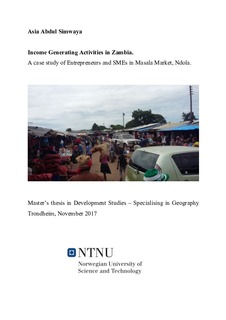Income generating activities in Zambia : a case study of entrepreneurs and SMEs in Masala market, Ndola
Master thesis
Permanent lenke
http://hdl.handle.net/11250/2506114Utgivelsesdato
2017Metadata
Vis full innførselSamlinger
- Institutt for geografi [1112]
Sammendrag
Due to the introduction of globalisation and free markets, coupled up with structural adjustment programmes in Zambia, markets have produced several opportunities and threats for entrepreneurs and small and medium scale enterprises. Whilst people lost their employment due to structural adjustments, it was up to them to find ways and means of sustaining their well-being, hence the engagement in entrepreneurship and small and medium scale enterprises.
The thesis aimed at gaining knowledge about entrepreneurship and small and medium scale enterprises, dwelling on the different types of activities that both men and women engage in. Various qualitative methods such as semi-structured interviews, focus group discussions, observation and secondary sources were used to collect data. The data was further analysed qualitatively, and conclusions were reached upon. This research had a total number of 14 participants, divided into 7 men and 7 women involved in entrepreneurship and small and medium scale enterprises.
The study showed that people mainly engaged in entrepreneurship due to lack of employment opportunities. In addition, due to structural adjustment programmes, many parents lost their jobs, hence affecting the children’s welfare by them being kicked out of schools due to nonpayment of school fees. This led many to either stop school or not gain any education or skills training, therefore, the only thing left was for them to be part of the informal sector.
The study realised that engaging in entrepreneurship and small and medium scale enterprise was a way to help business owners sustain their livelihoods and the family’s. Entrepreneurship and small and medium scale enterprise was seen to be a poverty alleviation tool.
